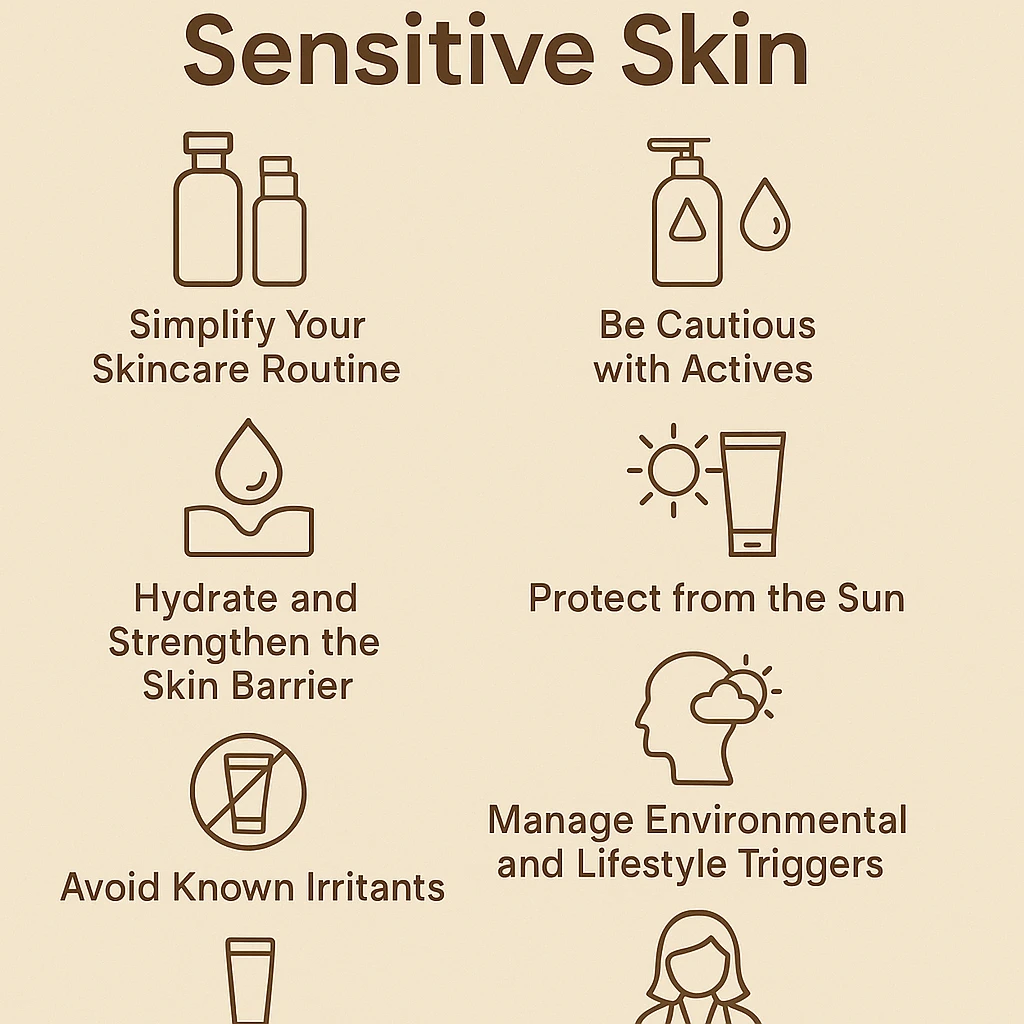How do i manage sensitive skin?
How to Manage Sensitive Skin:
Sensitive skin is easily irritated by environmental factors, skincare products, or internal changes. Symptoms often include redness, burning, itching, dryness, and tightness. Managing sensitive skin requires a careful, consistent approach focused on protection, hydration, and avoiding triggers. Here’s how to take care of it effectively.
1. Simplify Your Skincare Routine
Less is more when it comes to sensitive skin. Overloading with too many products or active ingredients can cause irritation. Start with a basic routine that includes a gentle cleanser, a hydrating moisturizer, and sunscreen. Avoid experimenting with new products frequently. Introduce one new product at a time, and patch test before full use.
2. Choose the Right Cleanser
Avoid harsh soaps or foaming cleansers that strip natural oils. Instead, opt for fragrance-free, sulfate-free, and alcohol-free cleansers. Look for products labeled "for sensitive skin" and those containing soothing ingredients like glycerin, ceramides, or aloe vera.
3. Hydrate and Strengthen the Skin Barrier
Sensitive skin often has a compromised moisture barrier. Using a moisturizer twice daily helps retain hydration and protect the skin from irritants. Look for ingredients like:
-
Ceramides – restore the skin barrier
-
Hyaluronic acid – retains moisture
-
Squalane – provides lightweight hydration
-
Colloidal oatmeal – soothes irritation
Ointments and creams are generally better than lotions for sensitive skin because they contain less water and more protective ingredients.
4. Avoid Known Irritants
Sensitive skin can react to common ingredients such as:
-
Fragrance and essential oils
-
Alcohol (especially denatured alcohol)
-
Harsh exfoliants (physical scrubs or strong acids)
-
Preservatives like parabens or formaldehyde-releasing agents
Always read ingredient labels carefully. Opt for products labeled hypoallergenic, fragrance-free, and non-comedogenic.
5. Be Cautious with Actives
If you want to use active ingredients like retinoids or vitamin C, introduce them slowly and choose gentler formulations. For example, azelaic acid and niacinamide are generally well-tolerated by sensitive skin and can help with redness, inflammation, and uneven tone.
Start with a lower concentration, apply only a few times a week, and always use a buffer like moisturizer to reduce irritation.
6. Protect from the Sun
Sun exposure can worsen sensitivity, redness, and inflammation. Use a broad-spectrum sunscreen with SPF 30 or higher daily, even indoors. Mineral sunscreens containing zinc oxide or titanium dioxide are often better tolerated than chemical sunscreens.
7. Manage Environmental and Lifestyle Triggers
Cold weather, wind, heat, pollution, stress, and even spicy foods can trigger sensitive skin. Wear protective clothing during harsh weather, and consider using a humidifier indoors during winter. Manage stress through regular sleep, hydration, and relaxation techniques like yoga or meditation.
8. Know When to See a Dermatologist
If your skin doesn’t improve or reacts severely to most products, consult a dermatologist. You may have an underlying condition like rosacea, eczema, or contact dermatitis that needs targeted treatment.
In summary, managing sensitive skin means being gentle, consistent, and cautious. Stick to soothing, simple products, avoid irritants, and listen to your skin. Over time, a tailored routine can significantly reduce reactivity and keep your skin calm and healthy.

Related Blog
What Causes Oily Skin and Can It Be Managed Naturally? Exploring Root Causes and Gentle Solutions
Aug 2, 2025 by Admin
General
What Are the Signs That You Have Sensitive Skin? Key Symptoms to Help You Identify This Delicate Skin Type
Aug 1, 2025 by Admin
General